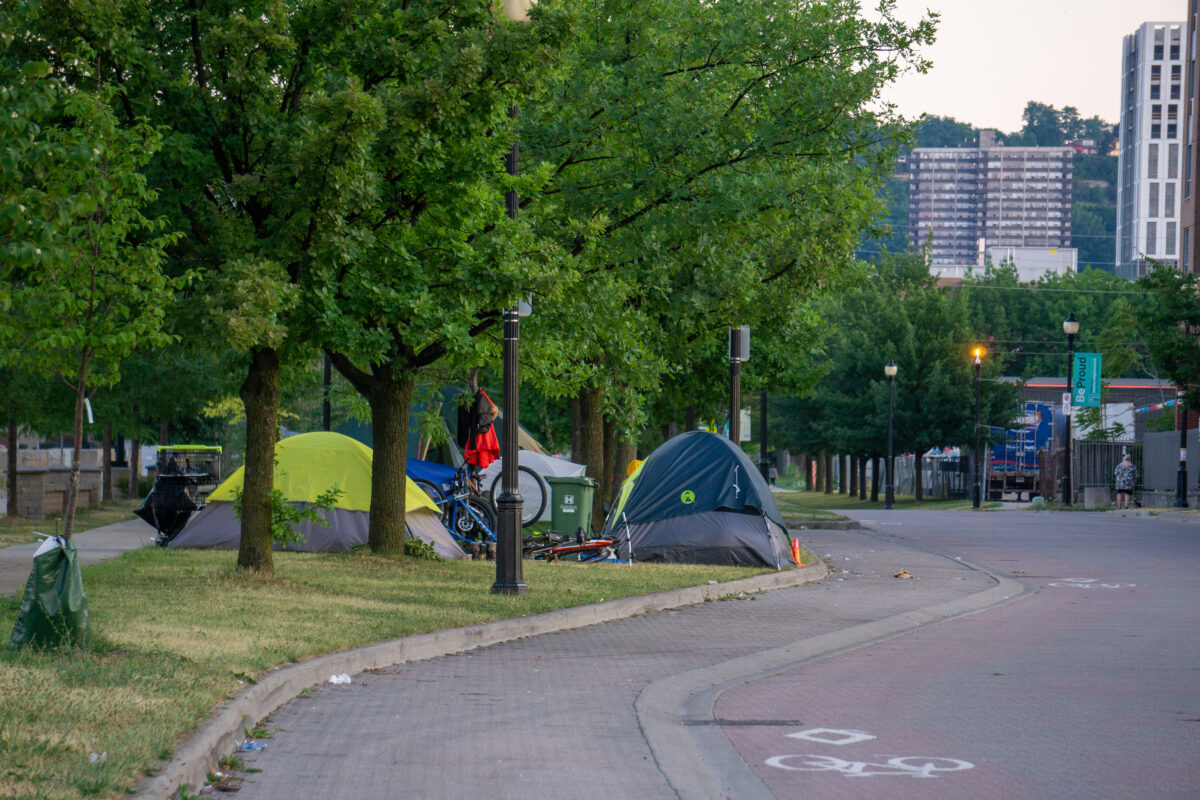Hamilton City Council says homeless encampments now represent “a situation or impending situation that constitutes a danger of major proportions that could result in serious harm to persons or substantial damage to property” and invoked rarely used powers to declare an emergency meeting tonight.
At the end of an hour long closed session, in a private video conference room, Council emerged with Ward 2 Councillor Jason Farr moving a motion to end the Encampment Protocol agreement the City reached last year with various advocacy organizations.
Council voted 10-2 to cancel the Protocol with Ward 1 Councilor Maureen Wilson and Ward 8 Councillor John-Paul Danko against the motion.
Farr’s motion read “that the enforcement protocol be repealed with a three-week grace period after council ratification with the direction provided to staff in closed session … remain confidential.”
The emergency meeting was held with two hours’ notice, with the City posting an agenda but not tweeting it in the list of today’s meetings.
“I would’ve thought Council would have the decency to reach out to us and talk before making such a drastic move,” says lawyer Wade Poziomka by phone tonight. Poziomka was co-counsel with lawyers from the Hamilton Community Legal Clinic during the 2020 encampment litigation.
“I’m a bit shocked and surprised by the action,” says Dr. Tim O’Shea. He was unaware that City Hall was considering the action.
Dr. O’Shea is an associate professor of medicine at McMaster University who specializes in infectious diseases. Dr. O’Shea is a doctor with the Shelter Health Network and was involved in negotiating the Protocol.
Both O’Shea and Poziomka state there are unaware of the City providing any notice of the impending decision, and the City has not provided reasons for the emergency decision tonight.
They each separately say discussions will occur among the non-City parties to the agreement regarding the next steps and a statement will be issued by the members of the coalition which negotiated the Protocol.
The 2020 settlement avoided a Superior Court hearing in which advocacy groups planned to seek an injunction preventing any enforcement actions against camping in public parks.
Keeping Six, one of the groups which were party to the litigation in 2020, provides a timeline of events and actions which led to the agreement.
Under the Protocol, encampments were only allowed for up to 14 days at a time, as measured from the arrival of the first tent.
The 14-day timeline did not apply to those living in encampments with high acuity, defined as a score above 13 using the Vulnerability Index – Service Prioritization Decision Assistance Tool test,
During the past 16 months, city councillors have received thousands of correspondences regarding encampments on all sides of the debate.
Newer advocacy groups such as the Hamilton Encampment Support Network have been formed to provide support to those living in encampments and to block the City of Hamilton from removing encampments. The HESN opposes the Protocol.
In a statement after the decision, the City of Hamilton writes the Protocol “has been deemed ineffective” and they are returning to “pre-pandemic enforcement of camping bylaws” beginning on August 30th.
“The City’s approach takes into consideration the safety and well-being of individuals living outdoors, as well as the broader community needs, including access to green space for safe outdoor recreation.”
“We are committed to meeting the needs of unsheltered and unhoused residents through continuity of service while supporting long-term housing stability for vulnerable residents,” reads the prepared quote from Mayor Fred Eisenberger in the statement. “Parks need to remain a safe place where all residents can enjoy and access outdoor spaces and amenities. Ensuring the safety and well-being of all residents remains a top priority for Hamilton City Council.”
The members of Council who voted to end the Protocol are: Farr (2, mover), Merulla (4, seconder), Collins (5), Jackson (6), Clark (9), Pearson (10), Johnson (11), Ferguson (12), Vanderbeek (13), Partridge (15).
Decisions made during public safety emergency meetings are final.


Not too long ago, July 21st, Jason Farr, assisted by a City Planning guy trying to address the sorry state of Central Park (look for real action soon) in which he extolled the two week allowed grace period camping in City Parks as being more humane approached than policies in surrounding municipalities, Toronto, etc. Farr being the mover to the PROTOCOL shows and tells the sorry state of our city council – say one thing and then do the opposite, all done in closed session, remaining confidential
Finally some sort of action. They didn’t need to do it in “secret” but it’s an emergency meeting and laws allow it. And I don’t want to just push homeless people aside; however, parks near me have been over run with tents, junk , food, shopping carts, pee and poop and my kids nor I can really enjoy them anymore. Tax payers pay to keep them clean…. We need to help the homeless but I don’t think letting them camp out in downtown parks making them unusable for others is the right thing either
You can tell the city is acting honestly and above board, when they suddenly have a meeting in as close to secret as they can get away with, and then refuse to give the details of what they decided without consulting relevant parties. Like… Fred, buddy, we don’t need parks so bad that we should toss folks to the wovles.